Have It Your Way
"Have it Your Way." The successful campaign by Burger King which reflects the fast-food chain's commitment to tailor orders to individual preferences and tastes. What a great concept, right? Why shouldn't we expect that experience with everything? I mean, who hasn’t picked up a novel only to find they disliked it from the first few pages, but hung on for a few chapters until they finally just had to stop reading? And maybe even felt disappointed enough to want to lash out, warn others, quickly banging out one of those scathing one- or two-star reviews. I get that.
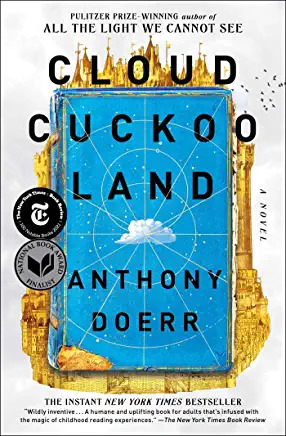
Like me, I think many reader/critics expect to repeat a previous experience they found to be pleasurable or satisfying, quick to reject that which doesn’t achieve those ends. Anthony Doerr’s new novel, Cloud Cuckoo Land, is riding high on the popularity list, with a stellar rating of 4.5 percent, with over 25,000 reviews! Yet, Cloud Cuckoo Land is not without its detractors, the one- and two-star reviewers who found it impossible to finish, putting it down after a hundred pages or so. “It isn’t, All the Light We Cannot See,” was a repeated cry by numerous disappointed consumers (approximately three percent of all reviews, so still a very low percentage). Yet, even those who didn’t finish the book still felt entitled to review it. Full disclosure, I am a huge Doerr fan, from the first story I read years ago in his short story collection, The Shell Collector, and everything since. Do I find some truth in what the bad reviews are saying about Cloud Cuckoo Land? Sort of (I get why some are reacting the way they are) but it doesn’t dampen my love of his work, nor would I ever leave a scathing review, no matter how much I was unable to approach his new novel. Why? Because I accept that even though I’ve been writing for over thirty years, I would never feel qualified to question Doerr's work, or his approach. Doerr is a genius, maybe the best writer working today. An unparalleled talent. So if I find it challenging, or difficult, it's an opportunity for me to drop the walls and learn. That’s why I will finish Cloud Cuckoo Land, right to the last page, a novel that somehow is becoming more and more brilliant to me each and every day!
My own novels have fallen under these harsh reviews by disappointed readers when I failed to meet expectations. No writer ever sets out to alienate readers, and I feel terrible when someone has a horrible experience from one of my stories. While at the same time, there is nothing I can do about it. Unlike Burger King, there is no way for me to please everyone. Part of the problem with my work, as well as other authors, is that some novels are difficult to categorize, not falling neatly into any one genre, which isn’t fair to readers who expect one thing and get something different. Even my agent vacillated over the proper category for The Cabin on Souder Hill. The publisher decided to go with Mystery/Thriller, which may have left many readers displeased, one so angry they said: “Never again!” to Busch’s novels.
I probably should just categorize my work as “literary,” though that would raise ire as well. About to work on this post, I was researching Margaret Atwood’s book, The Handmaid’s Tale, which surprisingly was under both Politics and Social Sciences, as well as (the more recent version with a different cover) under Science Fiction and Fantasy. But reading the blurb, I could see that it was both, as well as Literary.
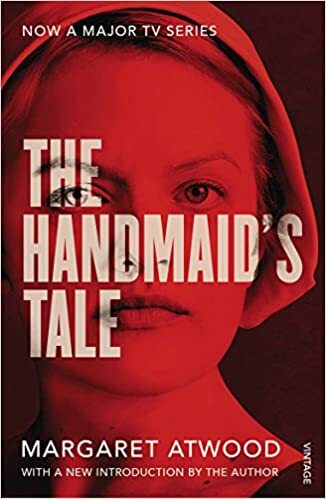
One book that was also hard to categorize was Sarah Canary by Karen Joy Fowler. Over a decade ago I bought Fowler’s book, which was a Nebula Award Nominee for best science fiction or fantasy book. Unfortunately, I don’t think I made it more than twenty pages before I just put it down. It wasn’t until 2022, thirteen years later, that I pulled it from my shelf, dusted it off, and read it cover to cover in about two weeks. Fowler is an amazing writer, though I could never understand why Sarah Canary was nominated for The Nebula Award. I found nothing in Sarah Canary that violated science or came across as fantastic. Nevertheless, I didn’t care. The writing was stellar, the story moving, with fascinating historical snippets woven beautifully into the narrative. So what changed over that decade? I’m fairly certain it wasn’t Fowler’s book.
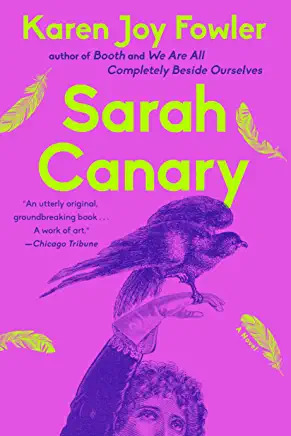
There have been many novels I’ve turned to the first page, brimming with anticipation, only to be disappointed or confused, or just unable to enter the story. Even so, I don’t think I could ever leave any author a one- or two-star review for a couple of reasons, one being that I won’t finish any novel that irritates me that much or is poorly written. And I wouldn’t feel good reviewing something I hadn’t completed. The second reason is something my dad used to say: “If you don’t have anything nice to say, don’t say anything at all.” I don’t believe he was promoting cordiality, but rather, giving me advice about not exposing my own ignorance through criticism of others, which I would have been guilty of on more than one occasion. So I am okay to move on from a disappointing read, but I understand when others aren’t; books cost money, and reading time is precious and limited, and no one wants either wasted on crap.
So blistering reviews are here to stay. Or are they? Maybe not. We are entering a new age that for many readers may be the balm they’ve been waiting for, while for others, like me, could spell the death of literature.
Under my own observations, I have concluded that we consumers of art and literature find it more and more difficult to approach these mercurial artforms with an unprejudiced mind, to hand ourselves over to the vision of the artist, to allow our minds to open to something new. I had this experience when I first started reading Philip K. Dick last summer (see my blog post, 2022, The Summer of Dick). I had no repository in my brain for his writing. It was foreign to me, and it took me a while to fold down the walls and allow him to take me somewhere I hadn’t been before. Fourteen Dick novels later, I am so glad I accepted the challenge!
But there is something afoot that goes beyond mere disappointment. Never in my lifetime did I expect to see “book banning” in America. Watching a video walkthrough of a library completely void of books gave me chills. A story about an author of children’s books ghosted because she is Chinese. School books banned for teaching certain subjects that state officials don’t like. Over 20 books were recently banned from a rural Virginia high school, among them, IT by Stephen King, The Bluest Eye by Toni Morrison, The Handmaid’s Tale by Margaret Atwood, 1984 by George Orwell and many others I read in high school, some ousted just for merely mentioning sex or sexual assault. Just this past week in the library where I live, a group of people met with library staff to offer up their list of books they want banned from the public library! How far does this go? Are we going to see an entire generation enter society having lost their right to choose, incapable of discernment, critical thinking and creativity?
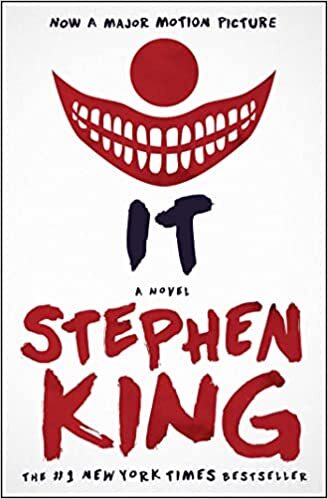
We may be on the brink of momentous change in how we consume fiction, as well as historical and other texts. AI. Artificial Intelligence. Machine Learning. Devoting my entire life to the pursuit of art (painting, commercial illustration, sculpture, print making, CG art, video editing, animation and writing) I watched with a tinge of horror on LinkedIn recently as artists and designers discussed—both arguing for and against—the value of machine learning in the field of advertising and design, and art in general, the implications mind-boggling and disturbing. So what does that have to do with fiction?
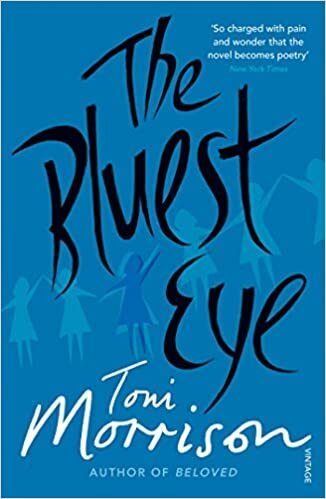
Some authors already use formulaic approaches to their work, attempting to ensure success of their novels by ticking all the right boxes. One influencer and proponent of self-published authors urges them to study the market where they plan to publish, then tailor their work to appeal to that audience. All these approaches shock me, because they’re not about exploring ideas, but only about marketing and making money. As an artist for over sixty years, I can’t help but feel this is the tail wagging the dog. But I am old school, it seems, with this slow rolling trend approaching for over twenty years, maybe longer, and picking up speed.
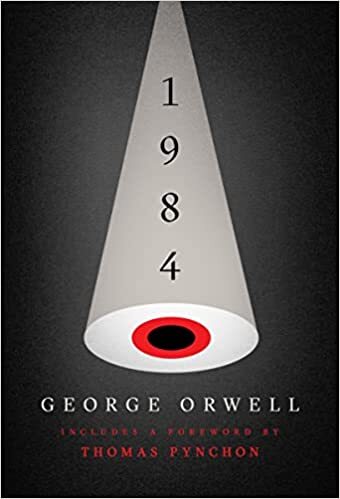
Back to machine learning, algorithms, and AI. Have you noticed that when you make an online purchase, you are bombarded with ads for that exact product, or a similar one, for days after, or sometimes even while you are still questioning your purchase in the process of closing your browser? The future is here, and there is no way to stop it. But let’s be clear, this so-called futuristic technology isn’t futuristic as much as it is intrusive, invasive, devious and unwelcome. At least to me.
But what does this have to do with book reviews and readers?

AI artwork_Shutterstock
Soon, every person could have books written and tailored specifically for them, stories that will check every box, hit every plot point at precisely the prefect moment. But how is this possible? AI machine learning is already trolling your reviews and comments, mining your preferences through your social media interaction, recording your purchases—clothing, books, food, cars—religious affiliation, political leanings. We wear devices that log if and when we exercise, when we enter REM sleep, when we dream, when we ovulate, tracking our menstrual cycles. Think of it, AI will be able to deliver exactly the novel you like reading. The villains you hate will be vanquished horribly. The heroes you love will always be victorious.
This possibility is not sci fi. We already have print on demand. We already have novel plotting software, character creation software, tension building software for authors (all too numerous to list here!). Machine learning is already chewing through and documenting your life preferences and prejudices. All AI needs now is to input the schematic of your psyche. Combine all this technology with your personal data and what do you have?
YNOD
Your Novel on Demand. Limitless variations under one title, with the story skewed to each individual reader. It would certainly wreak havoc on book clubs; same book supposedly, but with wildly different characters, plot points and conclusions. But it would be a story told the way you want it told, with the words you like, characters dressed appropriate to your taste and sensibilities, who believe and endorse only the things you do, who wear their hair the way you approve, who speak and think just the way you would expect them to, who act in accordance with your values, your core beliefs, your sexual preferences, who would never offer you an experience or situation to conflict with your world view. Machine learning will mine your expectations and deliver exactly the novel you like reading. No more consternation, no more thinking, no more challenge, just a peaceful pastime that will never impinge upon your conception of life, or take your hard-earned cash and drag you from your comfort zone.
1 The Road

First AI novel_2018
Let’s face it, Amazon’s Vella is already exploring this model (I had been thinking, with some reservations, of placing one of my stories there), where the author posts an episode every few days, or once a week, and readers weigh in on whether they like the characters, which way the plot should twist, how the story should proceed. To this I would say, "Be careful what you wish for."
AI and machine learning is our new future, and one of the most frightening aspects is, that we will have no way of knowing if the novel in our hands was written by a flesh and blood person, or some AI robot with a pen name created by a pen name generator (Reedsy has a pen name generator), armed with all the details of our life. Scary? Maybe, but according to some reviews I’ve read, it could be a welcome addition to the world of literature, to the new, “Have it Your Way” frontier.
For me, this potentiality is alarming. Yet there is nothing to be done about it. However, it would nudge me toward tackling my copy of James Joyce’s 732-page tomb Ulysses, with its forty or so punctuation-free pages at the end, which amounts to maybe the longest run-on sentence in history (AI would never allow such a thing!). Then I’ll follow Ulysses with Donald Barthelme’s, Amateurs, a book which I found difficult to read, but I’ll gladly make the effort again, embrace the challenge. Luckily, I have shelves filled with other books I’ve never opened, or stopped reading, and many I want to read again, books I know were penned with a flesh and blood poetic sensibility for language, forged through the angst, rumination and celebration over the struggle with what it means to be human.

Like me, I think many reader/critics expect to repeat a previous experience they found to be pleasurable or satisfying, quick to reject that which doesn’t achieve those ends. Anthony Doerr’s new novel, Cloud Cuckoo Land, is riding high on the popularity list, with a stellar rating of 4.5 percent, with over 25,000 reviews! Yet, Cloud Cuckoo Land is not without its detractors, the one- and two-star reviewers who found it impossible to finish, putting it down after a hundred pages or so. “It isn’t, All the Light We Cannot See,” was a repeated cry by numerous disappointed consumers (approximately three percent of all reviews, so still a very low percentage). Yet, even those who didn’t finish the book still felt entitled to review it. Full disclosure, I am a huge Doerr fan, from the first story I read years ago in his short story collection, The Shell Collector, and everything since. Do I find some truth in what the bad reviews are saying about Cloud Cuckoo Land? Sort of (I get why some are reacting the way they are) but it doesn’t dampen my love of his work, nor would I ever leave a scathing review, no matter how much I was unable to approach his new novel. Why? Because I accept that even though I’ve been writing for over thirty years, I would never feel qualified to question Doerr's work, or his approach. Doerr is a genius, maybe the best writer working today. An unparalleled talent. So if I find it challenging, or difficult, it's an opportunity for me to drop the walls and learn. That’s why I will finish Cloud Cuckoo Land, right to the last page, a novel that somehow is becoming more and more brilliant to me each and every day!
My own novels have fallen under these harsh reviews by disappointed readers when I failed to meet expectations. No writer ever sets out to alienate readers, and I feel terrible when someone has a horrible experience from one of my stories. While at the same time, there is nothing I can do about it. Unlike Burger King, there is no way for me to please everyone. Part of the problem with my work, as well as other authors, is that some novels are difficult to categorize, not falling neatly into any one genre, which isn’t fair to readers who expect one thing and get something different. Even my agent vacillated over the proper category for The Cabin on Souder Hill. The publisher decided to go with Mystery/Thriller, which may have left many readers displeased, one so angry they said: “Never again!” to Busch’s novels.
I probably should just categorize my work as “literary,” though that would raise ire as well. About to work on this post, I was researching Margaret Atwood’s book, The Handmaid’s Tale, which surprisingly was under both Politics and Social Sciences, as well as (the more recent version with a different cover) under Science Fiction and Fantasy. But reading the blurb, I could see that it was both, as well as Literary.

One book that was also hard to categorize was Sarah Canary by Karen Joy Fowler. Over a decade ago I bought Fowler’s book, which was a Nebula Award Nominee for best science fiction or fantasy book. Unfortunately, I don’t think I made it more than twenty pages before I just put it down. It wasn’t until 2022, thirteen years later, that I pulled it from my shelf, dusted it off, and read it cover to cover in about two weeks. Fowler is an amazing writer, though I could never understand why Sarah Canary was nominated for The Nebula Award. I found nothing in Sarah Canary that violated science or came across as fantastic. Nevertheless, I didn’t care. The writing was stellar, the story moving, with fascinating historical snippets woven beautifully into the narrative. So what changed over that decade? I’m fairly certain it wasn’t Fowler’s book.

There have been many novels I’ve turned to the first page, brimming with anticipation, only to be disappointed or confused, or just unable to enter the story. Even so, I don’t think I could ever leave any author a one- or two-star review for a couple of reasons, one being that I won’t finish any novel that irritates me that much or is poorly written. And I wouldn’t feel good reviewing something I hadn’t completed. The second reason is something my dad used to say: “If you don’t have anything nice to say, don’t say anything at all.” I don’t believe he was promoting cordiality, but rather, giving me advice about not exposing my own ignorance through criticism of others, which I would have been guilty of on more than one occasion. So I am okay to move on from a disappointing read, but I understand when others aren’t; books cost money, and reading time is precious and limited, and no one wants either wasted on crap.
So blistering reviews are here to stay. Or are they? Maybe not. We are entering a new age that for many readers may be the balm they’ve been waiting for, while for others, like me, could spell the death of literature.
Under my own observations, I have concluded that we consumers of art and literature find it more and more difficult to approach these mercurial artforms with an unprejudiced mind, to hand ourselves over to the vision of the artist, to allow our minds to open to something new. I had this experience when I first started reading Philip K. Dick last summer (see my blog post, 2022, The Summer of Dick). I had no repository in my brain for his writing. It was foreign to me, and it took me a while to fold down the walls and allow him to take me somewhere I hadn’t been before. Fourteen Dick novels later, I am so glad I accepted the challenge!
But there is something afoot that goes beyond mere disappointment. Never in my lifetime did I expect to see “book banning” in America. Watching a video walkthrough of a library completely void of books gave me chills. A story about an author of children’s books ghosted because she is Chinese. School books banned for teaching certain subjects that state officials don’t like. Over 20 books were recently banned from a rural Virginia high school, among them, IT by Stephen King, The Bluest Eye by Toni Morrison, The Handmaid’s Tale by Margaret Atwood, 1984 by George Orwell and many others I read in high school, some ousted just for merely mentioning sex or sexual assault. Just this past week in the library where I live, a group of people met with library staff to offer up their list of books they want banned from the public library! How far does this go? Are we going to see an entire generation enter society having lost their right to choose, incapable of discernment, critical thinking and creativity?

We may be on the brink of momentous change in how we consume fiction, as well as historical and other texts. AI. Artificial Intelligence. Machine Learning. Devoting my entire life to the pursuit of art (painting, commercial illustration, sculpture, print making, CG art, video editing, animation and writing) I watched with a tinge of horror on LinkedIn recently as artists and designers discussed—both arguing for and against—the value of machine learning in the field of advertising and design, and art in general, the implications mind-boggling and disturbing. So what does that have to do with fiction?

Some authors already use formulaic approaches to their work, attempting to ensure success of their novels by ticking all the right boxes. One influencer and proponent of self-published authors urges them to study the market where they plan to publish, then tailor their work to appeal to that audience. All these approaches shock me, because they’re not about exploring ideas, but only about marketing and making money. As an artist for over sixty years, I can’t help but feel this is the tail wagging the dog. But I am old school, it seems, with this slow rolling trend approaching for over twenty years, maybe longer, and picking up speed.

Back to machine learning, algorithms, and AI. Have you noticed that when you make an online purchase, you are bombarded with ads for that exact product, or a similar one, for days after, or sometimes even while you are still questioning your purchase in the process of closing your browser? The future is here, and there is no way to stop it. But let’s be clear, this so-called futuristic technology isn’t futuristic as much as it is intrusive, invasive, devious and unwelcome. At least to me.
But what does this have to do with book reviews and readers?

AI artwork_Shutterstock
Soon, every person could have books written and tailored specifically for them, stories that will check every box, hit every plot point at precisely the prefect moment. But how is this possible? AI machine learning is already trolling your reviews and comments, mining your preferences through your social media interaction, recording your purchases—clothing, books, food, cars—religious affiliation, political leanings. We wear devices that log if and when we exercise, when we enter REM sleep, when we dream, when we ovulate, tracking our menstrual cycles. Think of it, AI will be able to deliver exactly the novel you like reading. The villains you hate will be vanquished horribly. The heroes you love will always be victorious.
This possibility is not sci fi. We already have print on demand. We already have novel plotting software, character creation software, tension building software for authors (all too numerous to list here!). Machine learning is already chewing through and documenting your life preferences and prejudices. All AI needs now is to input the schematic of your psyche. Combine all this technology with your personal data and what do you have?
YNOD
Your Novel on Demand. Limitless variations under one title, with the story skewed to each individual reader. It would certainly wreak havoc on book clubs; same book supposedly, but with wildly different characters, plot points and conclusions. But it would be a story told the way you want it told, with the words you like, characters dressed appropriate to your taste and sensibilities, who believe and endorse only the things you do, who wear their hair the way you approve, who speak and think just the way you would expect them to, who act in accordance with your values, your core beliefs, your sexual preferences, who would never offer you an experience or situation to conflict with your world view. Machine learning will mine your expectations and deliver exactly the novel you like reading. No more consternation, no more thinking, no more challenge, just a peaceful pastime that will never impinge upon your conception of life, or take your hard-earned cash and drag you from your comfort zone.
1 The Road

First AI novel_2018
Let’s face it, Amazon’s Vella is already exploring this model (I had been thinking, with some reservations, of placing one of my stories there), where the author posts an episode every few days, or once a week, and readers weigh in on whether they like the characters, which way the plot should twist, how the story should proceed. To this I would say, "Be careful what you wish for."
AI and machine learning is our new future, and one of the most frightening aspects is, that we will have no way of knowing if the novel in our hands was written by a flesh and blood person, or some AI robot with a pen name created by a pen name generator (Reedsy has a pen name generator), armed with all the details of our life. Scary? Maybe, but according to some reviews I’ve read, it could be a welcome addition to the world of literature, to the new, “Have it Your Way” frontier.
For me, this potentiality is alarming. Yet there is nothing to be done about it. However, it would nudge me toward tackling my copy of James Joyce’s 732-page tomb Ulysses, with its forty or so punctuation-free pages at the end, which amounts to maybe the longest run-on sentence in history (AI would never allow such a thing!). Then I’ll follow Ulysses with Donald Barthelme’s, Amateurs, a book which I found difficult to read, but I’ll gladly make the effort again, embrace the challenge. Luckily, I have shelves filled with other books I’ve never opened, or stopped reading, and many I want to read again, books I know were penned with a flesh and blood poetic sensibility for language, forged through the angst, rumination and celebration over the struggle with what it means to be human.
Published on February 18, 2023 16:13
•
Tags:
ai, anthony-doerr, critique, fiction, george-orwell, karen-joy-fowler, machine-learning, margaret-atwood, stephen-king, toni-morrison, writing
date newest »
newest »
 newest »
newest »




I remember saying I don't like historical novels. Then one day I read one and loved it. Now it's actually a genre that I look for. If YNOD came about before this happened, I would have been denied the joys of reading this genre.
As for negative reviews, I have been guilty of this at times, if I feel strongly enough. Some writing seems so awful that I wonder how it got published. I recall once writing "The characters were vile and I don't care what happens to them." I noticed someone had hit "like" on my review. Imagine my surprise when I realised it was the author. It occurred to me that maybe the characters were meant to be vile.